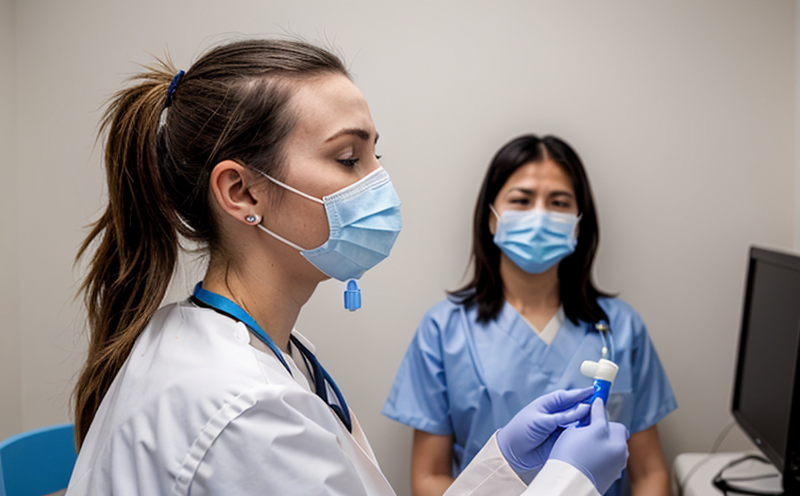Pneumocystis carinii Respiratory Testing in Rodent Colonies
The Pneumocystis carinii respiratory testing service is a critical tool for ensuring the health and integrity of rodent colonies used in research, particularly those involved in pharmaceutical development and preclinical studies. Pneumocystis, a genus of opportunistic fungi that can cause pneumonia, represents a significant threat to immunocompromised hosts. This test plays an essential role in maintaining the quality and reliability of laboratory animals by identifying potential infections early.
In the context of clinical & healthcare testing, particularly respiratory disease testing, ensuring rodent colonies are free from Pneumocystis is crucial for several reasons. Firstly, it prevents contamination that could lead to false-positive results or confounding data in experiments. Secondly, it safeguards the integrity and validity of research findings by ensuring that any observed effects on the animals can be attributed accurately to the experimental variables rather than opportunistic infections.
The test involves multiple steps, including sample collection from the respiratory tract of rodents using sterile swabs, followed by microscopic examination for the presence of Pneumocystis organisms. Advanced molecular techniques such as PCR may also be employed depending on the sensitivity required and the prevalence of the infection in the colony. This approach ensures that even low-level infections can be detected.
The application of this test is particularly relevant in sectors where animal welfare is a paramount concern, ensuring that animals are not subjected to unnecessary suffering or compromised health due to undetected infections. By adhering to stringent quality control measures and using internationally recognized standards, this service provides reliable results that contribute to the ethical conduct of research.
The test also supports compliance with regulatory requirements set by organizations such as the US Food and Drug Administration (FDA) and the European Medicines Agency (EMA), which mandate the use of disease-free animal models in drug development. This ensures that the testing process is not only effective but also compliant with global standards, enhancing the credibility of research outcomes.
Moreover, this service aids in the early detection of Pneumocystis infections, allowing for prompt intervention and treatment if necessary. Early identification can prevent the spread of infection within a colony, thereby minimizing disruptions to ongoing experiments and ensuring that resources are not wasted on infected animals.
The use of this test is particularly beneficial for laboratories conducting long-term studies or those involved in vaccine development, where maintaining a healthy animal population is critical for successful outcomes. By leveraging this service, researchers can ensure that their colonies are robust and resilient, contributing to the overall success of their projects.
Applied Standards
| Standard | Description |
|---|---|
| ISO 3876-1:2010 | Microbiology of the environment - Part 1: Isolation and identification of fungi from air samples. |
| ASTM E1495-15 | Standard test method for quantitation of airborne fungal spores using a scanning mobility particle sizer (SMPS). |
| Standard | Description |
|---|---|
| EN ISO 12100:2007 | Microbiology of the environment - Sampling and preservation for quantitative isolation from air. |
| IEC 62305-2:2015 | Electrical installations in medical practice - Part 2: Protection against electric shock - Medical electrical equipment and systems. |
Why Choose This Test
- Ensures disease-free rodent colonies for robust research outcomes.
- Promotes ethical conduct by preventing unnecessary animal suffering.
- Aids in early detection and prevention of Pneumocystis infection spread.
- Maintains compliance with global regulatory standards.
- Supports the integrity of experimental data through accurate and reliable results.
- Guarantees robust colonies, essential for successful long-term studies.
Competitive Advantage and Market Impact
The Pneumocystis carinii respiratory testing service offers a competitive edge in the market by providing a reliable means to ensure rodent colonies are free from opportunistic infections. This service is particularly valuable for pharmaceutical companies, biotech firms, and academic institutions that rely heavily on animal models for drug development and preclinical research.
By ensuring disease-free colonies, this test helps these organizations achieve more consistent and reproducible results, which can significantly enhance the quality of their research outputs. The ability to detect infections early also allows for timely interventions, reducing the risk of experimental failures due to contaminated animals. This not only boosts the reliability of clinical trials but also contributes to the overall efficiency and effectiveness of drug development processes.
The service's adherence to international standards ensures that it meets the highest quality benchmarks, thereby enhancing the credibility and acceptance of research findings in both national and international markets. This can lead to greater recognition for the organizations using this service, potentially opening up new opportunities for collaboration and funding. In a highly competitive landscape, such reliability and consistency are key differentiators.
Moreover, by maintaining robust animal colonies, this service supports sustainable research practices that align with ethical standards. This is particularly important in today's increasingly environmentally conscious world, where there is growing pressure to reduce the number of animals used in experiments while still ensuring the quality and validity of research findings.





